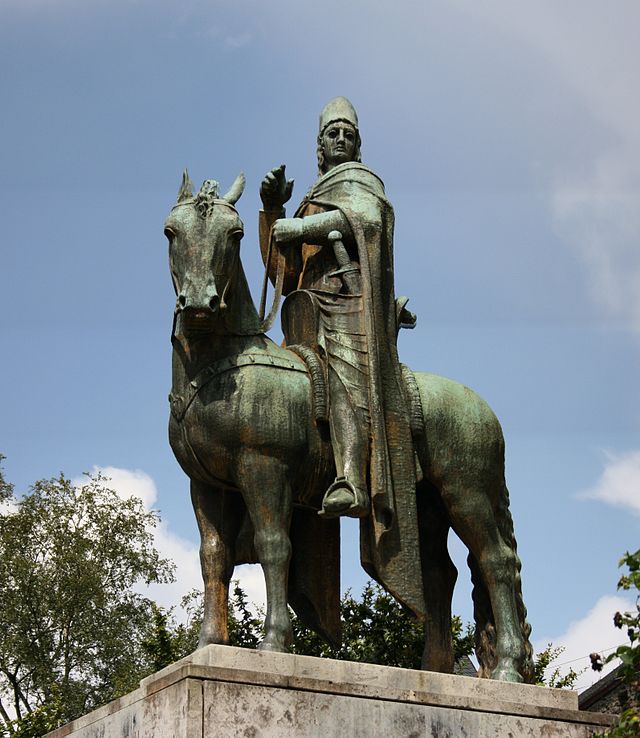Loading AI tools
Archbishop governing the Archdiocese of Cologne From Wikipedia, the free encyclopedia
The archbishop of Cologne governs the Roman Catholic Archdiocese of Cologne in western North Rhine-Westphalia. Historically the archbishop was ex officio one of the prince-electors of the Holy Roman Empire and ruled the Electorate of Cologne.

Since the early days of the Catholic Church, there have been ninety-four bishops and archbishops of Cologne. Seven of these ninety-four retired by resignation, including four resignations which were in response to impeachment. Eight of the bishops and archbishops were coadjutor bishops before they took office. Seven individuals were appointed as coadjutors freely by the pope. One of the ninety-four moved to the Curia, where he became a cardinal. Additionally, six of the archbishops of Cologne were chairmen of the German Bishops' Conference.
Cardinal Rainer Woelki has been the archbishop of Cologne since his 2014 transfer from Berlin, where he was also cardinal archbishop.
All names before Maternus II are to be approached with considerable skepticism, as little contemporary evidence is available. Maternus was present at a council in Rome in 313. The bishops between Severinus and Charentius are also apocryphal. Domitianus was the Bishop of Maastricht (Mosa Traiectum). The given dates of office before Gunther are also conjectural, at best.

| Image | Name | From | To | Notes |
|---|---|---|---|---|
| Konrad von Hochstaden | 1238 | 1261 | ||
| Engelbert II von Falkenburg | 1261 | 1274 | ||
| Siegfried II of Westerburg | 1274 | 1297 | ||
| Wikbold I von Holte | 1297 | 1304 | ||
| Heinrich II von Virneburg | 1304 | 1332 | ||
| Walram von Jülich | 1332 | 1349 | ||
| Wilhelm von Gennep | 1349 | 1362 | First Elector of Cologne under the Golden Bull of 1356 | |
| Adolf II von der Marck | 1363 | 1363 | ||
| Engelbert III von der Marck | 1364 | 1369 | ||
| Kuno von Falkenstein | 1370 | 1371 | ||
| Friedrich III von Saarwerden | 1372 | 1414 | ||
| Dietrich II von Moers | 1414 | 1463 | ||
 |
Ruprecht of the Palatinate | 1463 | 1480 | |
 |
Hermann IV of Hesse | 1480 | 1508 | |
 |
Philip II of Daun-Oberstein | 1508 | 1515 | |
 |
Hermann V von Wied | 1515 | 1546 | Sought to reform religious practice in the Electorate; converted to Protestantism; deposed and excommunicated. |
| Adolf III of Schauenburg | 1546 | 1556 | ||
| Anton of Schauenburg | 1556 | 1558 | ||
| Gebhard I von Mansfeld-Vorderort | 1558 | 1562 | A founding member of the Schmalkaldic League | |
| Friedrich IV of Wied | 1562 | 1567 | ||
 |
Salentin von Isenburg-Grenzau | 1567 | 1577 | Upon the deaths of his younger and older brothers, there were no more brothers to carry on the family name; he left Church administration in 1577, married, had two sons and conducted a successful military career. He died in 1610. |
 |
Gebhard II Truchsess von Waldburg | 1577 | 1583 | Converted to Calvinism in 1582; married Agnes von Mansfeld-Eisleben (cousin once removed of the archbishop and Prince-Elector Gebhard I von Mansfeld-Vorderort); Competing archbishop elected; Cologne War decides the outcome. |
 |
Ernest of Bavaria | 1583 | 1612 | Brother of William V, Duke of Bavaria; Papal Nunciature established permanently in Cologne. |
 |
Ferdinand of Bavaria | 1612 | 1650 | Brother of Maximilian I, Elector of Bavaria, nephew of Ernest of Bavaria. Principle of Secundogeniture. |
 |
Maximilian Henry of Bavaria | 1650 | 1688 | First cousin of Ferdinand Maria, Elector of Bavaria |
 |
Joseph Clemens of Bavaria | 1688 | 1723 | Brother of Maximilian II Emanuel, Elector of Bavaria. Put under Imperial ban for siding with France in the War of the Spanish Succession. |
 |
Clemens Augustus I of Bavaria | 1723 | 1761 | Brother of Charles, Elector of Bavaria and Emperor. Last Wittelsbach to hold the office. |
 |
Maximilian Frederick of Königsegg-Rothenfels | 1761 | 1784 | |
 |
Maximilian Franz of Austria | 1784 | 1801 | The electorate's left-bank territories were seized and annexed by France in 1795 |
 |
Anton Viktor of Austria | 1801 | 1803 | The electorate's remaining territories were secularized and given to the Landgrave of Hesse-Darmstadt in 1803. |
Seamless Wikipedia browsing. On steroids.
Every time you click a link to Wikipedia, Wiktionary or Wikiquote in your browser's search results, it will show the modern Wikiwand interface.
Wikiwand extension is a five stars, simple, with minimum permission required to keep your browsing private, safe and transparent.